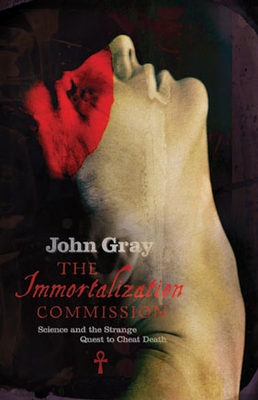
The Immortalisation Commission by John Gray (Allen Lane, £18.99)
From his beginnings as an enthusiastic Thatcherite to his late ’90s rebirth as scourge of humanists, John Gray’s shtick is unchanging. Like an aggrieved adolescent rocked by his discovery human beings are merely maladapted animals, he endlessly reiterates this single insight. This is then combined with various anti-Utopian debunkings, kicking in a long-opened door. Gray is perhaps the only writer who could attack neoliberal capitalism on the basis of it being too optimistic about human nature. Subject matter is irrelevant, the song is always the same; and so it is with The Immortalisation Commission, on “the strange quest to cheat death”.
The story is in three parts; “Cross-Correspondences”, on the British Society for Psychical Research in the late 19th century; “God-building”, on the USSR; and “Sweet Mortality”, on climate change and “the singularity”. What links these disparate phenomena is their shared belief that posthumous life can be achieved by scientific means, a delusion which he regards – rightly, no doubt – as a misunderstanding of Darwinism.
By some measure, the most successful part is the first, which chronicles the various seances and “scripts” held by the “SPR”, under its founder Frederic Myers, whose work on telepathy and post-mortem communication was considered by Freud and Andre Breton to have accidentally chanced upon some of the insights of psychoanalysis and surrealism. Public figures, including one-time Prime Minister Arthur Balfour and writers from Conan Doyle to WB Yeats, supported these endeavours, driven by a combination of grief and unwillingness to face their own animality and mortality. It’s a fascinating and melancholic story, which Gray’s laboured interjections about their foolishness can’t quite mar.
The Immortalisation Commission could have been an interesting enough account if left there. It comes radically, alarmingly unstuck, though, when it comes to the Soviet and contemporary examples. Gray considers that “God-building”, an esoteric interest of some Russian communists – most prominently writer Maxim Gorky and commissar Anatoly Lunacharsky – which Gray doesn’t stop to examine in any great detail, assuming he’s guessed what it is from the name, was an essential part of the Soviet system. Essentially, his argument is that Communism was an occult, Gnostic conspiracy to cheat death by killing millions, a marvel of historical analysis that Glenn Beck would have been proud of. His evidence, when not outright inaccurate (the mistakes are many: most glaringly of all, the notion that Gorky was ever a “Bolshevik leader”), centres on the esoteric interests of one leader of the Cheka and the one-time trade minister, along with the occultism of American Stalin-apologist Walter Duranty. Regardless of one’s opinion on Communism, blaming these minor esoterica for the gulag is as risible as blaming Conan Doyle’s seances for the First World War.
The final, perfunctory notes on Ray Kurzweil’s admittedly dubious notions of technological transcendence and the impossibility of a viable renewable energy economy are marked by a similar glibness. By the end you wonder if death might indeed be the sweet release Gray argues it to be.

